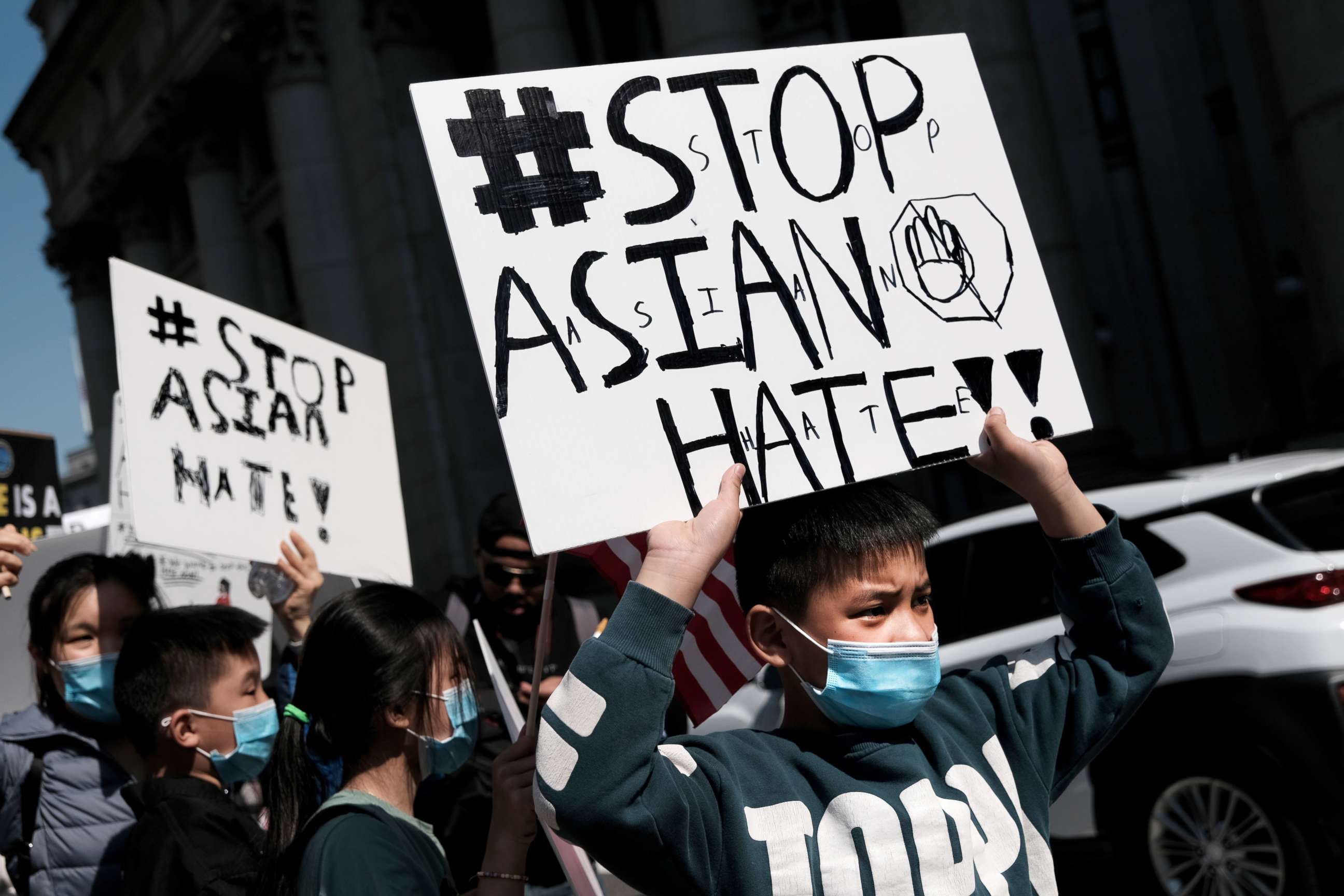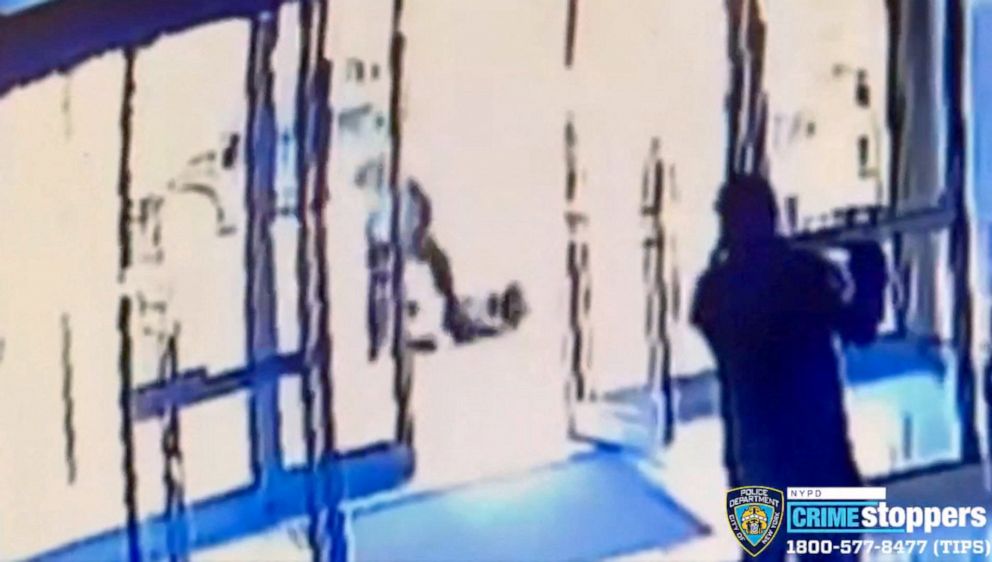Survivors of hate crimes and bias incidents speak out about their journey to recovery
Hate crime survivors struggle with attacks on their identity.
Vilma Kari, 65, was brutally attacked in broad daylight while walking to church in New York City on March 29. The suspect, Brandon Elliot, allegedly kicked Kari in the face and knocked her to the ground where he continued to stomp on her near Manhattan's Times Square, according to the New York Police Department.
The surveillance footage of the assault, which is being investigated as a hate crime, went viral.
Though Kari’s focus has been on recovering physically from her serious injuries, her daughter Elizabeth said they’re beginning the process of healing from the trauma together. Kari still has yet to leave their home, her daughter said.
“It's been a long road to healing both physically and emotionally,” Elizabeth said. “She went through some of the psychological questions like, ‘What did I do? Did I provoke him?’ and I'm like, ‘No, you didn't do anything.’”
Elliot was arrested and charged with assault as a hate crime, attempted assault as a hate crime, assault and attempted assault. He had been previously convicted of murder in 2003, according to the NYS Department of Corrections and Community Supervision, and authorities say he was released on parole in 2019. He is being held without bail and has a court date on May 10. He has not yet entered a plea.
Kari, an immigrant from the Philippines, said she is not ready to speak out personally about her trauma, but instead allowed her daughter to speak on her behalf.
She’s just one of thousands of Asian Americans who have been reportedly targeted in a recent wave of hate crimes and bias incidents across the country. While reporting on hate crimes often focuses on the impact on victims and communities, stories about the path forward for victims and the healing process are heard less frequently.
With her daughter by her side, Kari and many others are faced with a long path ahead toward recovery and healing. Together, the two have been donating to anti-hate organizations and seeking out the warm words of their loved ones to begin their journey forward.

Reported crimes that targeted Asian people rose by nearly 150% in major U.S. cities from 2019 to 2020, according to a study from the Center for the Study of Hate and Extremism at California State University, San Bernardino.
And Stop AAPI Hate, a national organization against anti-Asian hate, recorded roughly 3,795 hate incidents from March 19, 2020 to February 28, 2021. This number doesn’t represent the entire landscape of anti-Asian hate in the U.S., the organization said, since it only tracks the incidents recorded to their hate reporting center and many incidents and crimes go unreported.
Kari initially wanted to work on her healing alone and in secret, according to her daughter, who says she reminded her that the assault was part of a larger wave of anti-Asian hate.
Moving forward from hate
Evangeline Chan, a co-chair of the Safe Horizon AAPI Affinity Group, said that the hardest part about being a survivor of a hate crime is knowing that someone was attacked for something they cannot change -- their identity.
“If you're targeted based on your race, religion, sexual orientation or other protected ground -- that's something that is so intrinsically fundamental to your identity that you can't change,” Chan told ABC News in an interview. Safe Horizon is a nonprofit organization that offers support to crime victims. “So that just results in the sense of helplessness over the victim, and a sense that this could happen again,” Chan says.
She said that survivors of hate crimes or hate incidents are likely to experience trauma, anxiety, depression and PTSD in a way that’s different from victims of other types of crime because of how personal the attack can feel.
Dr. Michi Fu, a licensed psychologist and professor at California State Polytechnic University, said that hate crime survivors might see the symptoms of trauma in small aspects of their daily life. Lack of sleep, change in appetite, or inability to focus can all be signals of a body that is processing trauma. Paying attention to your body and changes in your day-to-day habits is key to being able to address them, Fu said.

“Make your own healing a priority,” Fu said in an interview. “Try and be intentional about cultivating joy when that can be robbed from you. If you don't have that sense of safety, create a space where you can feel like you're belonging to a group.”
Fu said there are several steps that can help make recovery easier: ensuring one’s personal safety and security is key -- that can mean putting in extra locks or buying security cameras for your home to make sure they feel physically safe. She said it's also important to build a strong emotional support system with friends and family and seek empowering sources of information and advice from therapists, hotlines and support groups. Though professional help can be important to recovery, it may be inaccessible for some financially, but Fu said intimate sources of support are just as vital.
Fu said to seek support from community members and local cultural organizations for fundamentals, like medical bills, property damages, or childcare. Kari, along with many other hate crime survivors, have started GoFundMe fundraisers to cover recovery costs.
She also said that putting one's energy toward activism can be an act of empowerment that survivors can find healing. Donating to organizations, marching on the streets and being a volunteer are just a few examples that Fu said it can make survivors feel in control again.
Relying on community support
Yong Choi, 82, was also a recent victim of a hate incident. Her husband of almost 57 years, Byong, had died in early February and just a few days after his funeral, she received a letter that read: “Now that Byong is gone makes it one less Asian to put up with in Leisure World. You fricken [sic] Asians are taking over our American community! … Watch out! Pack your bags and go back to your country where you belong!”
She was living in the Leisure World retirement community in Seal Beach, California. Her daughter Claudia said her mother is too scared to leave her home and doesn’t feel safe going for her morning walks in the neighborhood.
“Uprooting her family, working a super hard job, a hard life to provide for us and she's stoic, you know, but when it was quiet and we were there with her she would just -- tears would be rolling down her face,” Claudia said, on behalf of her mother. “When what was supposed to be a safe community is actively attacking you, but not only the attack and the threat, but the fact that they were celebrating my dad's death -- that, in particular, was very hurtful.”
Police have yet to find the perpetrator, but Claudia said the community support has helped her mother get through the trauma. She said the financial support, along with letters from friends, family and local organizations have helped make her mother feel at ease. Her daughters would help read the letters of support, and she’s held onto the kind words of those around her to feel safe.
A statement on the Leisure World website condemned the attack: "Through community unity, we must join together and ensure that the unspeakable act by a single individual, yet unknown, will never happen again." The Seal Beach Police Department is actively investigating the incident.
Her mother is now in the hospital, and she said her father’s death and the hate incident may have contributed to her decline in health.
She said the Choi family made the decision to go public with the story because they saw what was happening around the country and wanted to urge the community to keep fighting against anti-Asian hate.
“It's definitely something my dad would have fought for, that we need to bring to light the fact that it's not safe for Asian Americans here and we have to make it safe because we're Americans, we belong in this country,” Claudia said.
Chan is urging people to stand up and make their support known as hate crimes continue to make headlines.
“It's important to not feel so isolated because one of the things that is a reaction to being part of the community that has experienced hate is to feel isolated,” Chan said. "It does affect an entire community and it is going to take a community response, and so it's important to reach out to others."




